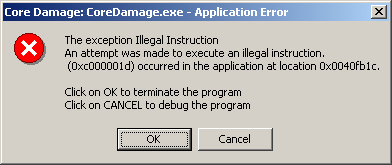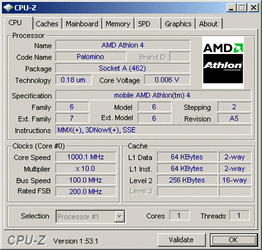- Joined
- Apr 7, 2009
An error is returned when Core Damage 0.8f is run on a computer with a Palomino mobile AMD Athlon 4 processor ("problem").
I have attached an image of the error message and CPU-Z screenshot of a mobile AMD Athlon 4 processor for which Core Damage fails on.
Please have the problem corrected such that Core Damage runs without crashing.
EDIT: Toast runs on the machine with the Palomino core processor without issue.
I have attached an image of the error message and CPU-Z screenshot of a mobile AMD Athlon 4 processor for which Core Damage fails on.
Please have the problem corrected such that Core Damage runs without crashing.
EDIT: Toast runs on the machine with the Palomino core processor without issue.
Attachments
Last edited:

